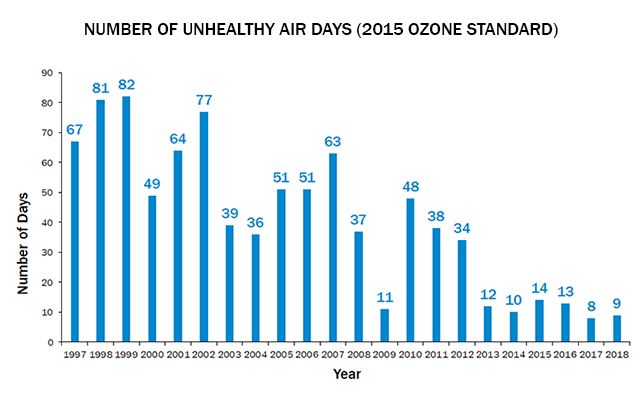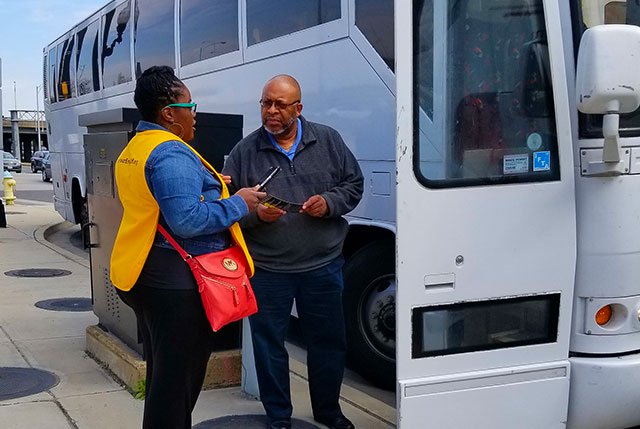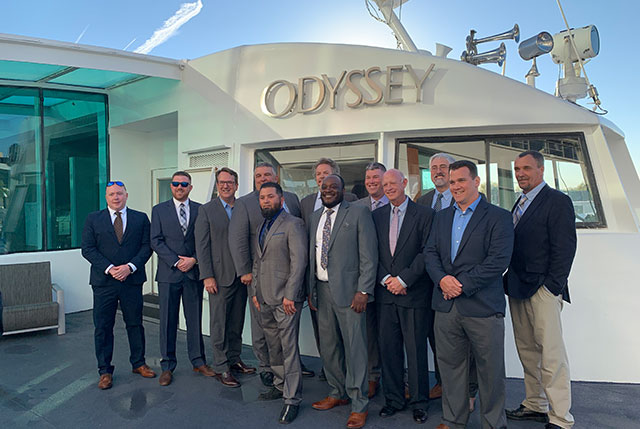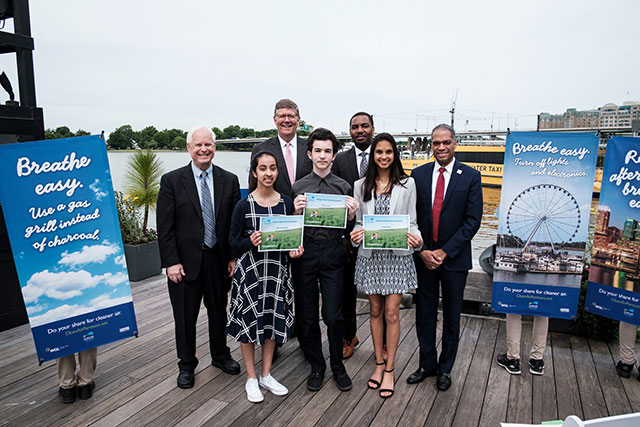Last year, our region experienced a Code Red day of unhealthy air for the first time since 2012. We also recorded eight Code Orange days that adversely affect sensitive groups, such as children, older adults, and people with asthma.
These unhealthy air days remind us that despite great progress—thanks to more than a decade of actions at the federal, state, local, and regional levels—we have more work to do to meet the federal ozone standard.
The number of unhealthy days has significantly decreased over the years in the region. (COG Air Quality Progress Dashboard)
MORE: Air Quality Progress Dashboard
The good news is our region has a set of strategies to guide our future work. The Metropolitan Washington Air Quality Committee’s What We Can Do to Improve Air Quality in the Metropolitan Washington Region report provides a menu of options, such as enhanced energy efficiency in buildings, green purchasing programs, and green electricity generation. In addition, I wanted to highlight recent initiatives that are advancing some other strategies found in this report.

Turn Your Engine Off Campaign - April 2019
Stopping idling and replacing dirty engines. Idling trucks and buses produce a lot of pollution. For example, if we reduced unnecessary idling by a typical long-haul combination truck, it would remove about 9 metric tons of carbon dioxide as well as other pollutants that produce unhealthy air according to the U.S. Environmental Protection Agency.
To get the important anti-idling message out, COG revived the Turn Your Engine Off education campaign this spring. Street teams engaged more than 260 truck and motorcoach drivers at locations throughout the region, promoting the financial and environmental benefits of diesel idle reduction and informing drivers (many who are from outside of our region) about local regulations.
In recent years, COG has also been working with Amtrak and boat companies to replace older diesel engines, whose emissions particularly impact neighborhoods near their operations such as NoMa, Ivy City, and the waterfront. In April, the Odyssey cruise ship was the latest vehicle retrofitted with state-of-the-art, clean diesel engines funded, in part, through a federal Diesel Emissions Reduction Act grant awarded to COG.

Odyssey Ribbon Cutting - April 2019
Expanding EV use. Electric vehicles—as well as other alternative fuel vehicles that replace gas-powered vehicles—improve the air since they do not release emissions of pollutants and greenhouse gases. Tailpipe emissions from cars and trucks contribute to approximately one third of our pollution.
To expand EV adoption, COG is continuing to work closely with state and local partners, particularly in the areas of EV Infrastructure deployment and diesel retrofit programs being implemented under the Volkswagen Settlement. This planning and coordination are key to ensuring that we have the infrastructure in place to support future demand.
At the Washington Auto Show in April, COG co-hosted an Industry-Government Electric Vehicle Roundtable and EZ-EV and Exelon debuted an electric drive experience where attendees could participate in indoor and outdoor ride and drives.
Encouraging individual actions to clean the air. As I said at the the Clean Air Partners Breathe Easy campaign kickoff, there are a number of actions that area residents can take to help our air quality, especially on days when pollution is at unhealthy levels.
For example, Clean Air Partners encourages residents to keep driving to a minimum, take transit, telework, or carpool, turn off lights and electronics when not in use, and follow tips from our electric utilities about how to keep our homes cool and use less electricity.

Clean Air Partners Campaign Kickoff - May 2019 (Pete Marovich)
While we do our part moving forward with these local, state, and regional programs, we must also continue to insist that the federal government recommit to a national strategy to address pollution by funding key programs and enforcing rules.
At the regional level, MWAQC has voiced our strong opposition to federal efforts that could roll back air quality progress, such as cuts to reduce or eliminate programs like state grants for air programs, the Diesel Emission Reduction Act, and the Clean Power Plan and lower the emission standards for new cars and trucks.
From government officials to citizens, we all have a role to play in this effort because every resident has a right to breathe clean air.
David Snyder is the Metropolitan Washington Air Quality Committee Chair at COG and a City of Falls Church Council Member.